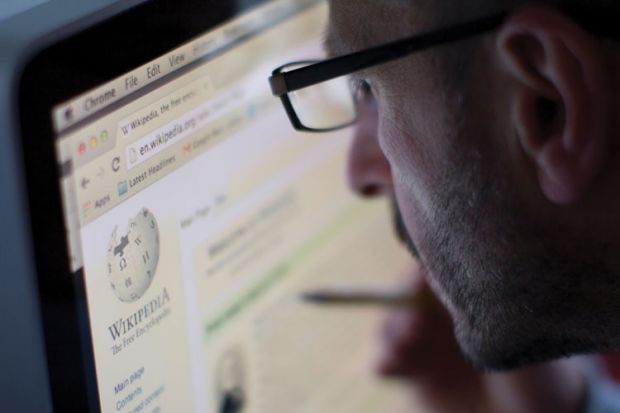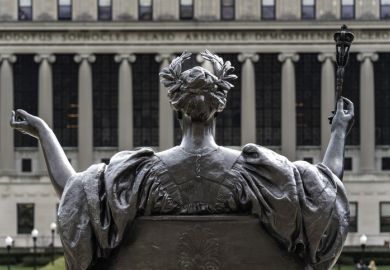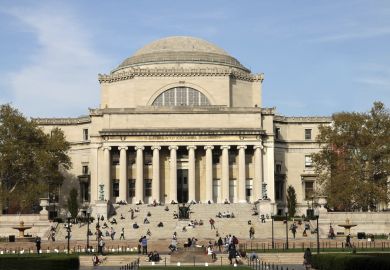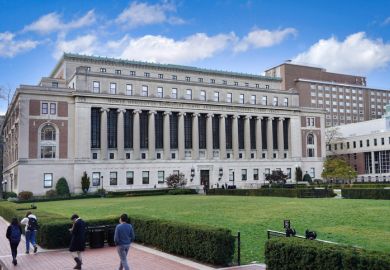Source: Alamy
Positive spin: a number of university pages on Wikipedia have been ‘finessed’ to show institutions in a better light
University press officers have been deleting negative information and finessing critical passages on their institutions’ Wikipedia pages, breaking the online encyclopedia’s guidelines in the process.
The revelations fuel debate over how far universities should go in burnishing their image in an era of higher tuition fees and greater competition for students.
In August, London Metropolitan University’s press office attempted to delete a section about comments made last year by vice-chancellor Malcolm Gillies, who said he was considering an alcohol ban on parts of the campus because conservative Muslim students considered the substance “immoral”.
Using an account called LondonMetropolitanUniversityPR, the press office also tried to remove a section on London Met’s apology to China for giving the Dalai Lama an honorary doctorate in 2008.
The Wikipedia account has since been banned by an administrator for “promotional editing” and representing a group rather than an individual. The deleted sections have been reinstated by other Wikipedia users. Between November 2012 and March this year, anonymous users with IP addresses traceable to London Met’s location tried to delete the section on “alcohol-free zones” on three occasions.
A spokesman for the university admitted that the named account had been used by the press office, but he did not know who was responsible for the anonymous edits.
He added that the press office was no longer editing Wikipedia.
Public relations staff are “very strongly discouraged” by the website’s guidelines from editing Wikipedia entries about their employers. But users with a conflict of interest are permitted to remove “spam and revert unambiguous vandalism”, or correct spelling and grammatical mistakes.
Changes to the University of the Arts London page reveal the editing of passages by its press office in May 2012.
A section outlining staff and course cuts was given a more positive spin, ending: “the university has consolidated and is looking to the future with cautious optimism”.
A spokeswoman for the institution said that the page had been updated “at the request of senior staff, who felt that the information was out of date and in some respects inaccurate”. She added that the user had declared her identity in advance.
In November 2011, the University of Wales press office removed references to the institution’s abolition and a section on a BBC undercover investigation that uncovered alleged visa fraud at a linked college.
A spokeswoman for the university said the edits were in response to “misleading” reports of the institution’s demise.
Conflict of interest ‘in theory’
Academics have also taken to editing the pages of their own universities.
Jonathan Jones, a physics lecturer at the University of Oxford, cut down and removed the title of a section on alleged “institutional racism” on Oxford’s page.
Professor Jones, a prolific editor of the site, acknowledged that as an academic he faced a conflict of interest “in theory”, but argued that modifying pages was not a problem if editors were open about their identities and obeyed Wikipedia’s guidelines. But he added that university press officers had “high conflicts of interest”, so needed to edit “with extreme care”.
“Unfortunately they are also among the least careful and least thoughtful editors around…their usual approach is simply to attempt to delete anything negative, rather than working to find a better sourced, more balanced alternative,” Professor Jones said.
Rebecca Price, partner at branding firm Frank, Bright & Abel, said that while prospective students knew Wikipedia was not always accurate, “it is where people sometimes go to do basic info searching before going elsewhere for richer content”.
But Peter Reader, director of marketing and communications at the University of Portsmouth, said that the online encyclopedia was “not a significant source of information” for potential applicants, for whom university websites were the most important resources.
He added that universities were caught “between a rock and a hard place” when it came to their Wikipedia pages. “On one hand, they want to provide accurate information,” an element strongly stressed by the government, he argued.
“On the other, Wikipedia guidelines can prevent the correction of even factual inaccuracies.”
This is illustrated by a case that may have breached the encyclopedia’s guidelines but was not an apparent attempt at airbrushing. The University of Bristol made 11 biographical edits to the page of Sir Eric Thomas, its vice-chancellor, created a new page for David Clarke, its deputy vice-chancellor, and altered a section on the university’s governance.
David Alder, director of communications and marketing at Bristol, said the edits were “limited to correcting factual inaccuracies”.
Register to continue
Why register?
- Registration is free and only takes a moment
- Once registered, you can read 3 articles a month
- Sign up for our newsletter
Subscribe
Or subscribe for unlimited access to:
- Unlimited access to news, views, insights & reviews
- Digital editions
- Digital access to THE’s university and college rankings analysis
Already registered or a current subscriber? Login




